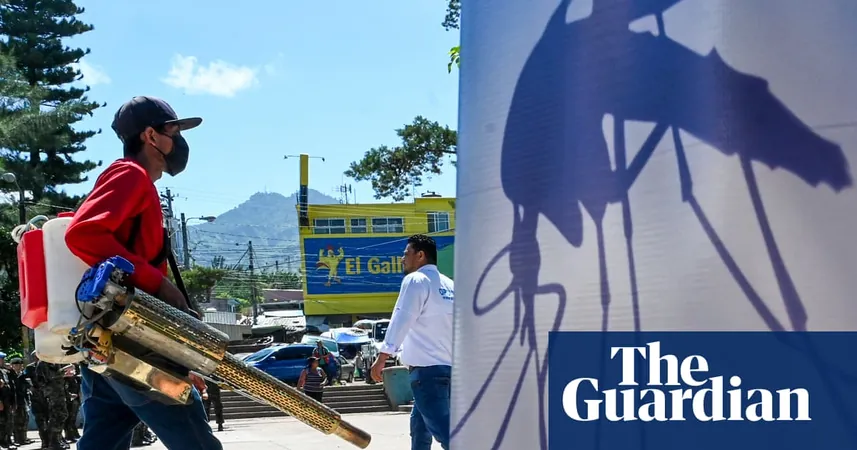
Alarming Spike in Dengue Fever Deaths Across the Americas: A Climate Emergency Unfolds!
2024-12-11
Author: Kai
In a shocking development, deaths from dengue fever have surged dramatically across the Caribbean and the Americas in 2024, with health officials reporting more than 7,700 fatalities to date. This figure marks a staggering increase of over 200% compared to the 2,467 deaths recorded in 2023, highlighting the escalating health crisis.
The Pan American Health Organization (PAHO) has revealed that around 12.6 million suspected cases of dengue have been reported this year alone – nearly triple the amount from last year. This surge is attributed directly to exacerbating climatic conditions, including rising temperatures, droughts, and intense flooding, which have expanded the habitat of the mosquitoes that transmit this dangerous virus.
PAHO director Jarbas Barbosa stated that the current situation is the worst recorded since data collection began in 1980, emphasizing that the confluence of fast population growth, unplanned urbanization, and poor sanitation systems has further fueled the spike in cases.
Brazil is at the epicenter of this dengue outbreak, recording over 10 million cases, followed by Argentina and Mexico, which have reported more than 580,000 and 500,000 cases respectively. In the Caribbean, Guyana leads with over 41,000 cases, while French Guiana and the Dominican Republic follow closely behind.
In the United States, local transmission has been identified in states such as California, Florida, and Texas. This year's outbreak has revealed a concerning trend: the emergence of dengue serotype 3 as the predominant strain in Mexico, Central America, and parts of the Caribbean, which is causing alarm among health experts.
Dengue fever often manifests with mild symptoms like headaches and fever, but it can also turn severe, leading to life-threatening conditions such as severe bleeding and shock. Unfortunately, many patients exhibit minor to no symptoms, complicating timely diagnosis and treatment.
The situation in Puerto Rico is particularly alarming, with the island declaring an epidemic by late March after experiencing a near quadrupling of cases compared to the previous year. Officials noted that over 4,900 cases and at least nine deaths have been reported there, affecting even young victims as the rise in pediatric cases becomes evident.
In a heart-wrenching testimonial, a local English professor, Lydia Platón, shared her struggles with the illness, recounting debilitating fevers and lingering fatigue. It is critical for residents in affected areas to recognize the importance of preventive measures.
While vaccines have been introduced in countries like Peru, Brazil, and Argentina, they are mainly aimed at children and most effective for those previously infected. With limited supplies and uneven distribution, it remains essential to rely on traditional prevention methods.
Experts stress that combating the mosquito population is vital in controlling dengue fever. "If there’s no mosquito, there’s no dengue," Dos Santos reminded, emphasizing that collective vigilance and cooperation from communities are crucial in addressing this growing health crisis amidst the climate emergency.
As dengue fever cases continue to rise, will governments and health organizations be able to respond effectively, or are we looking at the onset of a public health catastrophe? Stay tuned as we closely follow this ongoing situation.

 Brasil (PT)
Brasil (PT)
 Canada (EN)
Canada (EN)
 Chile (ES)
Chile (ES)
 España (ES)
España (ES)
 France (FR)
France (FR)
 Hong Kong (EN)
Hong Kong (EN)
 Italia (IT)
Italia (IT)
 日本 (JA)
日本 (JA)
 Magyarország (HU)
Magyarország (HU)
 Norge (NO)
Norge (NO)
 Polska (PL)
Polska (PL)
 Schweiz (DE)
Schweiz (DE)
 Singapore (EN)
Singapore (EN)
 Sverige (SV)
Sverige (SV)
 Suomi (FI)
Suomi (FI)
 Türkiye (TR)
Türkiye (TR)